
LINKS
Main Menu
Site Map & Links
Amphibians and Reptiles of Ojibway
ADOPT-A-SNAKE
Adopting a snake makes a great gift for classes, environmentalists, or special occasions. Call the Ojibway Nature Centre for details.
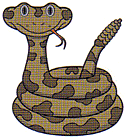


Note small fang size of adult
Massasauga (right) versus an
adult Western Diamondback (left)
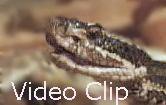
snake yawning (254 Kb). This behaviour is commonly seen after a snake has a meal.
EasternMassasaugaRattlesnake |
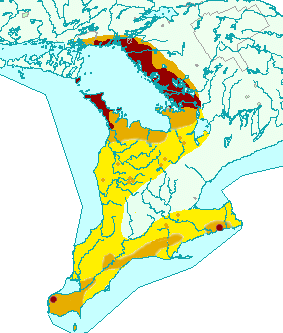 |
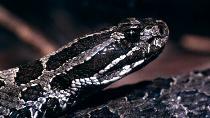 ONTARIO DISTRIBUTION
ONTARIO DISTRIBUTIONThe Eastern Massasauga Rattlesnake, Sistrurus catenatus, is the only venomous snake still found in Ontario. Although the venom is potent, this snake's small size and retiring habits make it a minor risk to humans.
Massasaugas once had a wider range and were far more common in southern Ontario near the shores of Lake Erie and Lake Huron. Rattlesnakes were common in the Windsor area fifty years ago but their population has seriously declined with development and urbanization of the area. They are still relatively common on the Bruce Peninsula and the eastern shoreline of Georgian Bay. Ojibway and the Wainfleet Bog near Port Colburne support small populations. 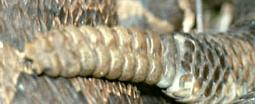
The range of the Eastern Massasauga closely coincides with the range of tallgrass prairie in the United States. Less than one percent of the original prairie remains in North America and the Massasauga has declined over much of its range. These attractive grey and black reptiles were once killed indiscriminately because of a perceived danger of being bitten. In Wisconsin this rattlesnake was considered a nuisance up to 1975 and bounties were paid for dead snakes. It is now considered endangered in Wisconsin and Massasaugas are protected in eight of the ten states where it is found.
Due to the rapidly disappearing habitat and declining population, the eastern massasauga rattlesnake has been officially designated as threatened and is protected from harassment or killing under Ontario's Wildlife Conservation Act and the Ontario Endangered Species Act . They are quite timid and pose no threat if they are left alone. For more information visit the provincial Massasauga Rattlesnake Species at Risk and federal Massasauga Species at Risk web sites.
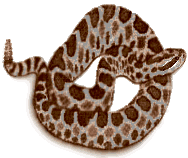 ETYMOLOGY
ETYMOLOGY
The name catenatus in Latin means chained or chain-like and refers to the central row of dark spots on the body. Massasauga is from the Ojibwa language and means "great river-mouth" which alludes to the marshy habitat of the snake.
IDENTIFICATION
A rattlesnake can be identified by the presence of bony, loosely segmented rattles at the tip of the tail (click here for sound), a pit between the eye and nostril and the vertical cat-like pupils. Adult length is about seventy-five centimetres (thirty inches). The head is not so triangular in shape as other rattlesnakes but it is noticeably wider than the neck.
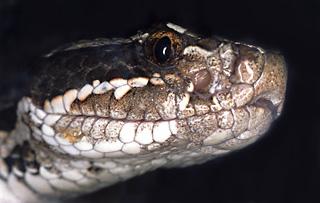
rattlesnakes is clearly visible between the eye and nostril.
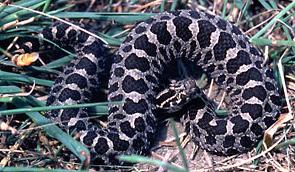
which is often yellow in colour. This individual is in a
defensive posture, with head up and body held very flat.
Most incidents of bites involve people who are trying to kill or capture a rattlesnake. In areas where snakes are common it is advised to wear footware and avoid placing hands in areas where visibility is limited. The best advice is simply to leave them alone.
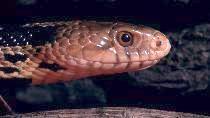 SIMILAR SPECIES
SIMILAR SPECIES
The Eastern Fox Snake is the largest snake in the Windsor area, attaining lengths of almost two metres. When captured or disturbed, this snake may imitate a rattlesnake by vibrating the tip of its tail. They are harmless and protected in Ontario.
INTERACTIVE SNAKE QUIZ
Try this interactive snake quiz.
